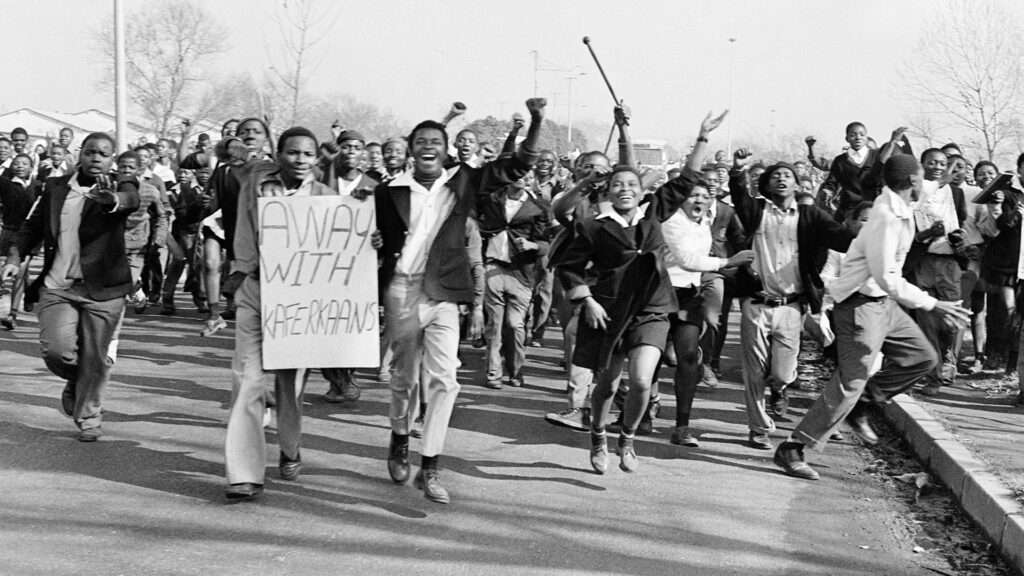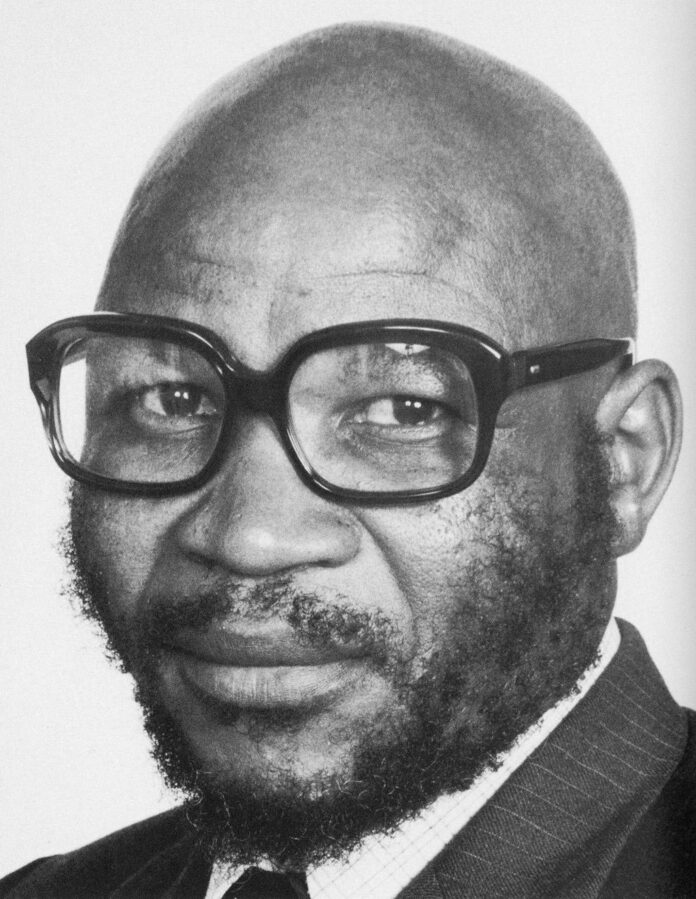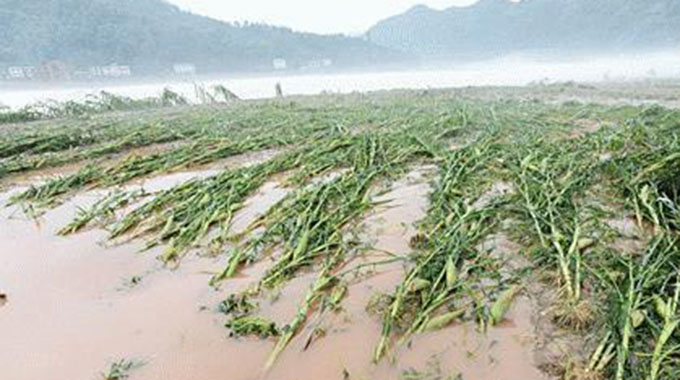Rapitse Montsho
July 31, 2021 marks 40 years since the brutal assassination of Joe Nzingo Gqabi in Zimbabwe.
Joe Nzingo Gqabi was born on April 6, 1929 in the rural village of Aliwal North in the Eastern Cape. His personal experience of dire poverty imbued in him the revolutionary spirit of clear analysis of how to conduct the armed struggle against the apartheid regime.
The stark reality of the hideous realities of apartheid caught up with him when he was a young adult. From his birth place of Aliwal North, Joe Gqabi went to de Aar in the Northern Cape and later travelled to Johannesburg. He met his wife Nomazotsho Aurelia in Johannesburg and was married in October 1958. In 1959 The Gqabi couple were blessed with their first born child Nonkululeko in 1959 and in 1961 Jomo, who has since passed away, was born.
In 1952 he joined the ANC and the Communist Party underground machinery. As a Photojournalist Gqabi’s best known investigative work was about the potato farms scandal of Bethal at which human remains were used as fertilizer for potatoes at the Delmas farms. This led to him being nominated for the much acclaimed international award, the Julius Fuchik medal, which was only won by Brian Bunting and Govan Mbeki at the time. In 1960 Gqabi was amongst the 2000 political detainees after the PAC led Sharpeville massacre.
During the generations of apartheid resistance, Joe Gqabi became a committed and distinctive volunteer of the newly formed umKhonto weSizwe; the armed wing of the ANC. When umKhonto weSizwe was formed on December 16, 1961 in Botswana, Gqabi heeded the clarion call of the conference declaration that said, “The time comes in the life of any nation where there remains only two choices, submit or fight…”.Naturally, Gqabi was amongst the first volunteers to go for military training in Nangin, China in the art of war and plastic explosives to prepare to fight. Gqabi went for training as a part of a unit of 6 that included Andrew Mlangeni, Raymond Mhlaba, among others.
Upon his return he was arrested in the then southern Rhodesia and sentenced to two years for travelling illegally. He was re-arrested and charged under the Sabotage Act. In 1963 he was arrested once more in the Northern part of Rhodesia with a unit of 28 MK operatives and deported to South Africa.
Tokyo Sexwale, who called Joe Gqabi the unstoppable hurricane, attributes the re-arrest of Joe for being involved in the sabotage campaign of the ANC in the Reef. He was convicted and sentenced to 10 years, adding to the two year sentence and thus served 12 years in Robben Island. In Robben Island, together with Mac Maharaj, Andrew Masondo and Ahmed Kathrada became part of a communications committee. Joe Gqabi was released on the 19 August 1975 from Robben Island. The unstoppable hurricane would then engage with the 1976 student’s revolt. Mrs. Gqabi admitted at the TRC that her children never really knew their loving father who enjoyed parenting.

The revolutionary fight for freedom
The uprisings, which prepared the solid foundation of the turning point of South Africa’s leadership, would need to be considered on a variety of milestone contributions by Gqabi. Firstly, Gqabi worked closely with the extraordinary and courageous young men and women who dared to criticize the absurdity and the abuses of power by the racist regime. Secondly, he provided a vital link between those who prosecuted the struggle internally as well as in exile to prepare for a rational and positive democratic order of sound administrative systems. Gqabi was central in rallying most of the epic expectations attached to the declaration in the Freedom Charter that “South Africa belongs to all who live in it”.
As diverse as the nature of formations and the ideologies of those who formed the broad resistance movement were, Gqabi was able to articulate the common ground that apartheid was archaic, no good, demonic, despicable and must be replaced by an order that must work for all in a new South Africa. In 1987 OR Tambo admitted that 1976 “caught the ANC by total surprise…we were not prepared for it,” he adds. Gqabi was in tune with the pulse of the youth uprisings and pointed the scepter of the revolt in the right direction.
At the 40th year since his assassination, July 2021 will be a year that will see most of them reaching the plateau of their age and being phased out of active national service. We ought to ponder whether the courageous sacrifices that the Gqabi family made for our democracy is the sacrifices we are living for. Needless to say Mrs. Gqabi has also reached her octogenarian years. At most we must admit that Gqabi never submitted to the silencing narrative of doing nothing towards the defeat of apartheid. His life was an embodiment of a crystal clear message of a better life for all. This was the most cherished article of faith by Gqabi. He galvanized the popular enthusiasm of the 1976 youth to become the driving force towards a new South Africa in order for them to be vindicated by the fulfillment of the ideals of democracy and sustained leadership.
In the framework of all the activities of Gqabi was the formation of a united South Africa. He developed the June 16 youth to leave South Africa both as an expression of sacrifice and the advancement of democracy. His intense preoccupation with the June 16 youth is better known for instilling a mature pattern of resistance, insistence on dignity and respect to punctuality as well as social harmony. He anticipated that the salt of our democracy has its value based on how we will transform the lives of the poor.
Two months after his release, Gqabi was eager to receive instructions from the exiled leadership of the ANC about the role he was to play hitherto. ivermectin horse dosage During this period Gqabi worked in Johannesburg near the Westgate station as a store manager for Kupukani. Gqabi sent me to Swaziland to receive instructions from the ANC leadership based in Swaziland; John Nkadimeng and Stanley Mabizela. The instructions from John Nkadimeng were short and stern: “Tell Joe we need him outside”, Nkadimeng said with his commanding voice. “There are no further instructions; he is tall and highly visible. Those chaps will kill him,” he concluded.
The struggle in exile
Gqabi left in 1977 for exile to intensify and to direct the internal prosecution of the struggle from Botswana. He was later deployed as the first Chief Representative of the ANC in the newly independent Zimbabwe from hence he could liaise and develop greater offensive against the apartheid regime. By 1979 he was among the team of six members from the Politico-Military Strategy Committee of the ANC who developed the Green Book based on their visit from Vietnam. In February 1981, an MK operative who worked with him; Joe ‘Kabelo’ Ganda made a gruesome discovery of TNT explosives that were set by the enemy to explode under his car. Fortunately, Ganda who noticed the bomb on time notified the Zimbabwean police who successfully detonated the explosives, prompting Gqabi to be more vigilant and increased his security. There is no doubt this was not enough.
Gqabi had developed a direct relationship and interface with the then Minister of State Security Emerson Mnangagwa who is now the President of Zimbabwe. They held regular meetings that dealt with a range of issues including the dynamism and postulate of the struggle against racism and apartheid. Gqabi had articulated to Mnangagwa the perfect attributes of equality that will manifest in a new South Africa. They were both aggrieved by the perversity of the oppressors who sought to consolidate their grip to the abuse of power and privileges.
The gruesome assassination
At around 8 and 9 pm on the night of July 31 1981, the aggressive mission of the apartheid regime to attack opponents who lived in exile with ghastly and daring brutality mounted a cruel blow to the ANC. The maneuvers by the Zimbabwe CIO personnel Collin Evans and Gary Bramfield together with some South African Intelligence agent VarkeVisser and others, bore the hallmarks of ultimate heartlessness and evil of apartheid and took it to the heart of a free and independent country with direct attack on the sovereign rights of a democratic country. Mrs. Gqabi only heard of the brutal murder of her husband on Radio and was compelled to verify the sad news at a house of her friend and Cde Jonas Gwangwa.
Joe “Kabelo” Ganda angrily recalled that early evening when assassins sneaked and mingled amongst the Zimbabwean security for an evil mission. ivermectina gotas quanox Geraldine Fraser-Moleketi vividly recalls that night of horror. “On the fateful evening of the assassination when we arrived at the Ashdown Park House in Harare and realized that something had happened, our immediate response was to inform Minister Mnangagwa in a bid for assistance. He called the head of intelligence and others to come to the scene”.
On the scene it could not be confirmed if the 18 cartridges of the shower of bullets were from the Israel produced Uzzi or not. Geraldine who was present at the house when his shattered body was eventually removed from the car, admits that Ganda and her saw the virtues of evil from internal vicious people whose intention was to stop the momentum of the struggle for a free South Africa represented by Gqabi. Minister Mnangagwa who was en-route to a summit in Zambia ensured that young and greatly angered Joe Ganda accompanied him to Lusaka to brief the ANC leadership at the Headquarters.
The brutal murder of Gqabi became an apocalyptic moment of history for Mnangagwa, Zimbabwe, Joe Ganda, Geraldine and the entire ANC. It altered the course of life for the ANC both internally and externally. Never had there been more eager disposition of the popular peoples’ power that involved the democratic movement inside South Africa, the intensity of the armed struggle, economic sanctions against the apartheid regime and the international boycotts towards total liberation than since 1981.
A State funeral for the ANC hero
The government of Zimbabwe declared a State funeral for slain Joe Gqabi in the continuation of full support of what the government called “a just fight”. At the funeral of Gqabi, the President of the ANC Oliver R Tambo, made a painful admission when he said, “to say the enemy has struck us a blow is to tell the truth… we are all at this graveside here today because the march from Africa’s colonial past to her social liberation continues, but we stand in these solemn grounds here today at the instance of Joe Gqabi who has been struck down…”
His son Jomo passed away without recovering from that deadly ambush. In the language of the poet, “the loving son, anxious of fathers’ paternity craved for sanity, a wish of the wise. So he could wisely tell of the fortunes of sacrifice”. In 1985 the Gqabi family saw the effects of the Klerksy Raid in Botswana.
Ggabi’s death and South Africa today
Will the everlasting grip of pain of his wife and daughter defy hate, so hate can be scorned by democracy? Where is the truth that Mrs. Gqabi must pardon?
Gqabi and his wife’s resistance to apartheid affirmed the supreme value of sacrifice for democracy and how each of them endeavored with their special skills of understanding underground work for the ANC so as to strike hard at the apartheid regime. Their care and love for each other was animated by the love and respect for the common love of a new democratic South Africa.
South Africa today needs to respond to the burning question as to whether our democracy has become compatible to the objectives that Gqabi sacrificed for. The ideals of a paradox of the morality and practice of democracy ought to inform us that much is at stake. From the perspective of reconciling the practice of our democracy and the purpose Gqabi died for, springs the idea of how Gqabi produced leaders, what molded them and how they ought to be. Gqabi grasped to a larger extent the various conditions in which the internal community contributed to the principles of a democratic South Africa as well as how they were perceived by those that were in exile.
In 2004 Joe Gqabi was reburied in Aliwal North where a 40th year memorial ceremony will be held on July 31, 2021. A disheartening feature for Mrs. Gqabi is that the Gqabi home in Aliwal North is dilapidated and in ruins. Is this a desirable legacy that the democratic government can bequeath the Gqabi family, one would ask? Their fight for the destruction of apartheid was to bring sovereignty to the people in an unrestricted manner as part of the outcome of the liberation struggle.
The natural interval between the liberation struggle and the legacy of those who sacrificed for it require us to summon the primary rationale for its aims-the transformation of the lives and conditions of the poor, a mantra that Joe Gqabi lived and died for. ivermectin dose for scabies in humans There has been no formal engagement to require us to forgive the killers recalls MaGqabi. “Why must I forgive faceless people who have never asked for forgiveness”, said Mrs. Gqabi. “I am delighted to realize that after 40 years since my husband was murdered, some investigation is now in progress, and this may bring to a closure the painful years that my children and I have suffered”. “My heart bleeds when I think of the killing of my husband, I have not found closure”. If those people are still alive I would like them to apologize to me here in my house in Soweto”. They must tell me who sent them to kill my husband and what exactly their mission was.”
The killers of Joe Gqabi are tainted with guilt, selfishness and immorality for their mission to murder 50 leaders of the African Nation Congress. MaGqabi and Nkululeko’s wish is to conduct a full and credible investigation that must reveal what the source of the unfettered evil was that gave the instructions to pursue an immoral campaign to assassinate her husband and father to her children and other ANC members.
Rapitse Montsho is a film maker and videographer as well as an emerging farmer. Contact: [email protected], WhatsApp: +27820405628









